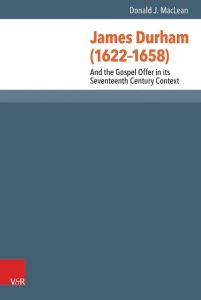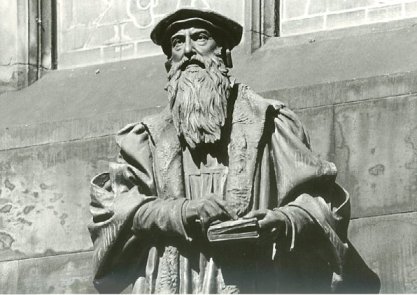 I had the privilege last week to be at the Free Church School in Theology. I was there to deliver a lecture on John Knox and John Calvin. It was good to be there and to renew friendships. Hopefully the lecture will be published but here is a little taster where I went on an excursus regarding James Durham and the call to the ministry.
I had the privilege last week to be at the Free Church School in Theology. I was there to deliver a lecture on John Knox and John Calvin. It was good to be there and to renew friendships. Hopefully the lecture will be published but here is a little taster where I went on an excursus regarding James Durham and the call to the ministry.
****************************
Neither Calvin, nor Knox, felt any internal call until the external call of the Church constrained them. And this I think presents a question to us regarding the relative balance we place between the internal and external call to the ministry. In neither of these men did the internal call come first, and in neither of these men did the internal call come until necessity was laid upon them by the church.
On this point James Durham (1622-58) has a very important essay in his Commentary on Revelation entitled “Concerning a Call to the Ministry and Clearness Therein”. While not neglecting the importance of the internal call Durham quotes a section from the First Book of Discipline (1560). He says, “the established doctrine of our church in the First Book of Discipline, in that head concerning Prophesying and interpreting Scripture … [is] Moreover men in whom it is supposed to be any Gift, which might edify the Church … must be charged by the Ministers and Elders to join themselves with the Session and company of interpreters, to the end that the Kirk may judge whether or not they be able to serve … in the vocation of Ministers. And if any be found disobedient, and not willing to communicate the Gifts and special graces of God with their brethren, after sufficient admonition, Discipline must proceed against them … for no man may be permitted to live as best pleaseth him, to live within the Kirk of God; but every man must be constrained by fraternal admonition, and correction, to bestow his labours, when of the Kirk he is required, to the edification of others.”[3]
Perhaps this strikes some as unspiritual? Surely an internal call is necessary? Well, yes but to what degree? A Durham would say, “there are more clear grounds to gather God’s mind from” regarding the call to the ministry than the internal call. He states that “the effects of the Spirit fitting one with Gifts for the charge … whereupon weight may be more safely be laid, than upon any inward apprehending, or not apprehending of the Spirit’s motion, which is never given to us in anything, as the alone rule of obedience; and we must suppose the motion of the Spirit to be where these Gifts are, seeing the impulse hath always the Gifts with it, so we may gather the impulse from the gifts.”[4] A position echoed later in the Reformed tradition by no less than Robert L. Dabney.
Whatever our view of the call to the ministry, we can this day record our thanks that the little gathered congregation in St Andrews compelled Knox into preaching, and that Farel in Geneva compelled Calvin to give up his goal of a quiet scholarly life. At least in these two instances the wisdom of the external call going before the internal call was justified of her children.
[3] Durham, Revelation, 75.
[4] Durham, Revelation, 73.

 I had the privilege last week to be at the
I had the privilege last week to be at the 

 My friend Andy Murray (who fed me many times in my student days!) has posted an article of mine on Thomas Chalmers on his blog “
My friend Andy Murray (who fed me many times in my student days!) has posted an article of mine on Thomas Chalmers on his blog “ Here is a nugget from one of John Murray’s reviews:
Here is a nugget from one of John Murray’s reviews: